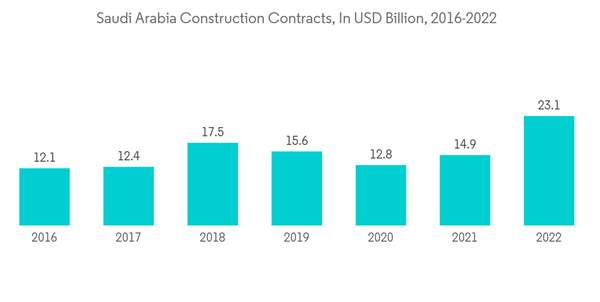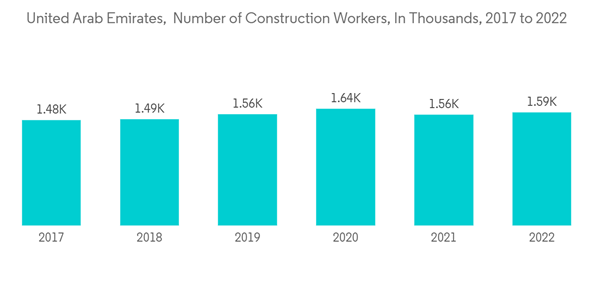Over the long term, major factors driving the growth of the market are the growing construction industry, increasing demand for cranes, and developing trends toward automation and telematics. The renting or leasing of construction equipment is on the rise, owing to an effort to lower the equipment purchase and maintenance expenses.
The renting or leasing of construction equipment is on the rise, owing to an effort to lower the equipment purchase and maintenance expenses. Apart from the cost, there are also other benefits associated with renting construction equipment. Rental companies provide the machinery, along with the required professional machine operators and drivers, thereby ensuring a hassle-free operation.
The construction sector is witnessing growth in GCC countries such as the United Arab Emirates, the Kingdom of Saudi Arabia, Qatar, and Bahrain due to the rise in construction projects related to roads, buildings, hotels, stadiums, and other infrastructure. Moreover, advancements in the rental method of construction machinery, such as digital platforms, are providing ease to the consumer, further acting as a big factor in the growth of the construction machinery market in GCC countries.
GCC Construction Machinery Rental Market Trends
Increasing Construction Activities in the GCC Region
In recent years, political unrest recently increased as global oil and gas demand slowed. As the world seeks greener and more sustainable energy sources, the oil economies are attempting to diversify their offerings to the world. Diversifying into tourism, luxury, and other sectors necessitates medium to large-scale commercial and living infrastructure projects. Some examples include Qatar's National Vision 2030, an ambitious project that began with the creation of a brand-new city for the 2022 FIFA World Cup. To attract tourists to this remote location, they identified the need to construct unique and impressive structures such as reclaimed islands, distinctively shaped buildings, massive malls, cultural centers, airports, and others.Therefore, renting earthmoving equipment, such as excavators, motor graders, and loaders, is increasing due to growing infrastructural projects related to road and highway networks in the Gulf countries.
Further, Six Flags Qiddiya, located 40 miles from Riyadh City in Saudi Arabia, is set to open in 2023 as part of the larger Qiddiya development. The Saudi megaproject will be three times the size of Walt Disney World in Orlando, with 28 rides spread across 32 hectares of land. The project is one of three major giga-projects within Vision 2030. The framework aims to diversify the country's income alongside NEOM and the Red Sea Project (a luxury tourist destination). These projects aim to increase tourism in Saudi Arabia so that visitors contribute 10% of the Kingdom's GDP by 2030.
The project's objective is to transform Riyadh into a major hub in providing sustainable transportation services and logistics services in the Middle East. The program will work on developing junctions between Riyadh’s ring roads and main routes. It will develop 400 km of the road network by adding new roads and upgrading existing junctions.
Several rental companies are expanding their rental fleet and are designing plans to upgrade their product portfolio to strengthen their position in the market. For instance,
- April 2022: My Crane, a digital disruptor for the crane and construction industries based in Dubai, announced its expansion with the signing of three more franchise agreements. At the recent Cranes and Transport Middle East conference in Dubai, Mycrane, a rapidly growing digital crane rental platform, appointed franchise holders for Qatar.
United Arab Emirates Likely to Lead the GCC Construction Machinery Rental Market
The UAE government prioritizes energy and infrastructure investment, including transportation, utilities, decarbonization, renewable and nuclear energy generation, and addressing ongoing water scarcity. The government's significant commitment and resources result in numerous projects and opportunities for construction and engineering firms in the UAE. The Abu Dhabi National Oil Company's (ADNOC) Al-Nouf seawater treatment plant, Dubai Municipality's plan to build a strategic sewerage tunnel, and other construction projects such as the redevelopment of Mina Rashid in Dubai and the Dubai International Financial Centre Expansion 2.0 are all recently announced.The UAE's construction sector is expected to recover strongly over the next five years, with construction industry value increasing by 3.7-4.7%. The country's development agenda, which focuses on expanding the country's industrial, transportation, and energy infrastructure, will drive growth. The UAE government announced plans to implement a series of projects aimed at accelerating the UAE's economic development and transforming the country into a comprehensive hub for all sectors as part of the Projects of the 50 initiative to attract USD 149.8 billion in foreign direct investment (FDI) over the next nine years.
Moreover, to meet the needs of the UAE's growing population and an increasing number of cars, transportation and road infrastructure development remain critical. This aligns with the government's plans to increase urbanism and tourism in Abu Dhabi and Dubai. The UAE is working on several transportation and road infrastructure projects, including the USD 11 billion Etihad rail project, the USD 5.9 billion proposed hyperloop project between Dubai and Abu Dhabi, the USD 2.7 billion Sheikh Zayed double-deck road project, and others. The growing demand for urban transportation, as well as the government's efforts to boost tourism and expand transportation infrastructure, will drive rail and road development across the country.
Moreover, the construction sector in the United Arab Emirates is expected to employ nearly 1.6 million people by 2021. Several projects and strategies, including the Energy Strategy 2050, the Sheikh Zayed Housing Program, and the Dubai Tourism Strategy, are in the works to stimulate the construction industry.
Such investments and development in the country are likely to create significant demand for construction machinery. It is likely to benefit the construction machinery rental market in the United Arab Emirates.
GCC Construction Machinery Rental Industry Overview
The GCC construction equipment/machinery rental market is fragmented as several local players hold some notable share across the region due to their local dealership network and local procurement capabilities. The rental companies are investing significantly in the GCC region for an edge over their competitors. Some of the other key players in the market are focusing on investments, product development, partnerships, etc., to gain a competitive edge over other players in the market. For instance,- In January 2023, Dayim Equipment Rental Co. teamed up with the Red Sea Development Co. to construct an on-site, carbon-neutral operations hub and to provide managed services for the Red Sea Project and AMAALA.
Additional Benefits:
- The market estimate (ME) sheet in Excel format
- 3 months of analyst support
This product will be delivered within 2 business days.
Table of Contents
Companies Mentioned (Partial List)
A selection of companies mentioned in this report includes, but is not limited to:
- Al Faris
- Bin Quraya
- Arabian Machinery & Heavy Equipment Co. (AMHEC)
- Byrne Equipment Rental
- Mohamed Abdulrahman Al-Bahar LLC
- Zahid Tractor and Heavy Machinery Company
- Johnson Arabia LLC
- Rezayat Sparrow Arabian Crane Hire Co. Ltd
- Abdullah H. Al Shuwayer Company
- Hertz Dayim Equipment Rental Co.
- Kanamoto Co. Ltd










